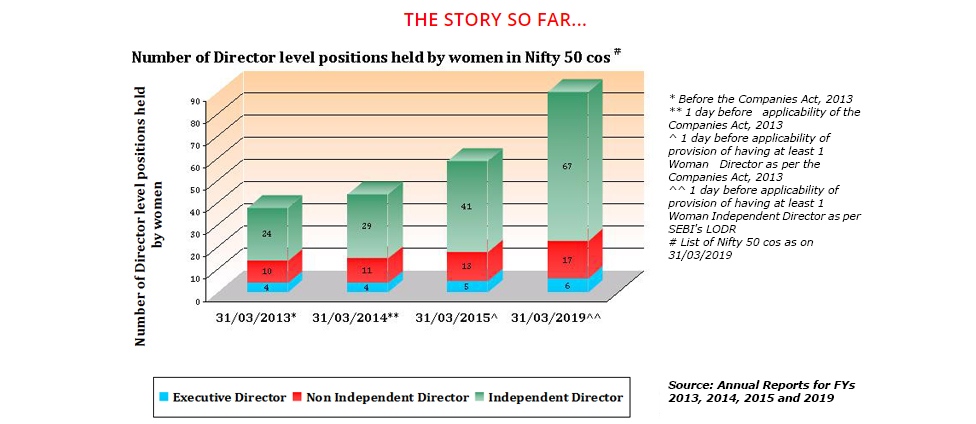
Corporate Governance Demystified
Excellence Enablers Private Limited
February | 2020
Strong institutions are a sine qua non of a functional ecosystem. Armed with this conviction, we raise, in this newsletter, some issues and concerns on regulatory organisations. Our objective is to provoke thinking rather than prescribe what ought to be done. Status quo does not seem to be a worthwhile option.
Editor
RANDOM THOUGHTS ON REGULATION

M. Damodaran
Chairperson, Excellence Enablers
Former Chairman, SEBI, UTI and IDBI
The Republic of India is in the news for a variety of reasons. 70 years after “We, the People of India” gave ourselves a Constitution to govern our life and work, it is perhaps a relevant time to take stock of where we are, and what we could have done differently or better. The canvas is vast, and the focus of this piece is to take a look at the world of regulations and its presiding institutional deities.
Over the decades, with a view inter alia to ensuring a level playing field between the public sector and the private sector, the Government has set up regulatory organisations and tribunals. The pace at which some of these were set up, responding in episodic fashion to developments in the real world, has often prompted the question whether we live in an age where the philosophy that guides us is “give me a problem and I will give you an institution”?
Regulatory organisations have multiple responsibilities. They need to ensure that the regulated universe conducts itself in an orderly fashion, develops itself in the public interest, and prevents, or at least minimises, the possible exploitation of the weak by the strong. If these lofty objectives are to be achieved, even partially, it is necessary that regulatory organisations are set up in the right manner, at the right time, and for the right reasons.
Creating institutions is the easier part. Capacity building to make those institutions relevant and functionally effective is much the harder part.
The first question that needs to be addressed when the question of creating a new regulatory body comes up is whether an existing body can be tasked with this responsibility. This question arose, however briefly, when the Pension Fund Regulatory and Development Authority (PFRDA) was being thought of. There was a very strong view that the Insurance Regulatory and Development Authority of India (IRDAI) could be given this additional responsibility. Having a large number of organisations, with limited briefs, gives rise to several problems including, but not limited to, turf battles and inconsistent policy positions.
It is difficult to conceive of any regulatory organisation in India which has the adequate capacity, both in numbers and skillsets, to satisfactorily discharge its responsibilities. In addition to domain knowledge, there is the requirement, especially at the senior most levels in such organisations, to have persons who are non-aligned with any interest group, and have the temperament, equanimity and poise to ensure a level playing field. The best way to get this done is to have a public selection of the heads of such organisations, along the lines that the United States of America follows when selecting persons for high office. Ideally, the persons selected should be neither applicants nor supplicants, and would have to be persuaded to take up these assignments in the larger public interest. Their credentials must survive the scrutiny of an appropriate Parliamentary Committee so that institutional credibility is not adversely impacted by the absence of individual credibility.
Relevant skillsets at different levels in the organisation is a non-negotiable requirement. For example, in a body that regulates the securities markets, there should be an abundance of trained legal personnel as well as trained accounting professionals. A little over a decade ago, an assessment of capacity was undertaken in the Securities and Exchange Board of India (SEBI), and it was found that there were very few lawyers and even less accountants. While lawyers were immediately sourced from leading law schools, with the then Chairman personally leading the initiative, accountants were hard to come by in requisite number. The fact that most of those lawyers left in a few years is a story for another day. The realisation that the securities market Regulator cannot be manned by general purpose MBAs did not seem to have arisen when the organisation was conceived and set up.
Regulatory organisations require a first-hand experience of what goes on in the regulated world. It is therefore ideal that persons manning higher positions in such organisations are those that have first-hand experience of being regulated. Knowing where the shoe pinches is necessary for pragmatic and meaningful regulation.
At middle levels and relatively lower levels in the organisation, it is extremely beneficial to bring in persons from the regulated universe for short spells so that their first-hand experience informs the process and content of the writing of regulations. In the United Kingdom for example, there is a longstanding practice of persons from the leading law firms, comprising the “magic circle”, being seconded to the regulatory body, enriching it with the energy, enthusiasm, and first-hand experience of the real world. Such a proposal when conceived more than a dozen years ago in India, was strongly discouraged, even before it took formal shape, on the ground that the identification of the law firms from which such secondment would take place could be criticised as an arbitrary exercise of power.
Movement in the opposite direction is also useful. Many decades ago, India’s banking regulator had a practice of deputing middle level officers to commercial banks for short periods so that practical experience gained at that time could contribute to regulation and supervision of the banking sector. Regrettably that practice was abandoned.
Capacity building is a necessary condition, but not a sufficient condition, for a good regulatory organisation. Credibility derived from clarity and consistency in the positions that it takes is what significantly reinforces confidence of the regulated universe. In the last decade, there have been several instances of rolling back of well-intentioned proposals, giving rise to the question why they were given effect to in the first place. This is best illustrated by the recent postponement of the decision to separate the positions of the Chairperson and the Managing Director/ Chief Executive Officer (MD/CEO). With a little over two months for the provision to take effect, it was, without assigning any reasons, postponed by two years. The fact that the prescription arose out of the recommendations of a High Powered Committee and a consultative process that followed the report of the committee, should ordinarily lead to the conclusion that everything that was relevant must have been taken on board. Such postponements, which eventually could lead to cancellation, undermine the credibility of regulatory organisations.
This is not the first high profile postponement. When Clause 49 of the then Listing Agreement was initially sought to be given effect to, there was a pushback from the corporate world on the ground that not enough time had been given to them to give effect to the provisions of this new clause. Some months later, a second postponement followed, and when that period was to expire, there was a clamour for a third postponement on the ground that the corporates were not yet ready. Had that postponement been agreed to, it is fair to presume that Clause 49 would not have seen the light of day, and the initial steps to usher in a climate of governance would not have materialised. There was also the related request that for Public Sector Undertakings (PSUs), either exemption should be granted or extension of time should be allowed. If this had been accepted, PSUs would not have been able to tick even the boxes which they have ticked so far in the name of practicing good corporate governance. There have also been several exemptions granted to individual PSUs from time to time. The cardinal principle that regulation must be ownership-neutral has on several occasions been laughed out of court.
Regulatory organisations require persons who have the ability to hear both sides and to arrive at reasoned conclusions, eschewing everything that is irrelevant and not germane to the issues at hand. This aspect of capacity building has also not been given adequate attention.
A similar problem exists with the debt recovery mechanisms that have been setup from time to time. There have been instances in the past of Presiding Officers of Debt Recovery Tribunals (DRTs) telling bank officials during proceedings to be lenient with defaulters who had taken the bank for a ride. Now we are witnessing the problem of irrelevance creeping into pronouncements of Tribunals. In a recent high profile case, the Presiding Officer felt it appropriate to go to Wikipedia, and based on information admittedly gathered therefrom, write several pages in praise of one of the contending groups that were before him as litigants. It is high time that the highest court in the land came down heavily on such Presiding Officers to ensure that their orders deal with only facts in issue and other relevant facts.
For human beings, three score and ten is the lifespan that the Bible intended. As the Republic gets into its eighth decade, it is time to reinvent, and breathe new life into, the organisations that have been set up with high expectations and lofty goals.

READERSPEAK – IF WISHES WERE HORSES…
S Hajara, Former CMD, Shipping Corporation of India
“Completely concur that criminalization of corporates and their directors can never lead to higher standard of corporate governance. Over prescriptiveness can also lead to mere box ticking rather than any actual improvement in the standard of corporate governance.”
Apurva Purohit, President – Jagran Prakashan
“Having a clear F1 (First priority) is essential; however another word for focus is sacrifice, which many of us are unwilling to do! So scaling up top-line or maximizing profit ? Job creation or managing the fiscal deficit? Gathering experiences or gathering visa stamps while traveling? All these are hard choices and we have to have the courage to choose one and let go of the other!”
Jitender Balakrishnan, Director on Boards and Former Deputy MD, IDBI
“Excellent Article on The Corporate Governance scene during 1919 including a fair bit of humour thrown in . The major Happenings during the Year were well covered, thought provoking and raises issues for which Solutions may only evolve over time. But one thing is certain – The Way We do Business in India is definitely changing.”
PM Kumar, Founder, Human Endeavour and Former Business Chairman and Board member, GMR Group
“Succinct, thematic overview of “governance 2019”.”
Do let us know of any specific issues you would like to see addressed in subsequent issues.
Excellence Enablers
Corporate Governance Specialists | Adding value, not ticking boxes | www.excellenceenablers.com

 (292KB)
(292KB)